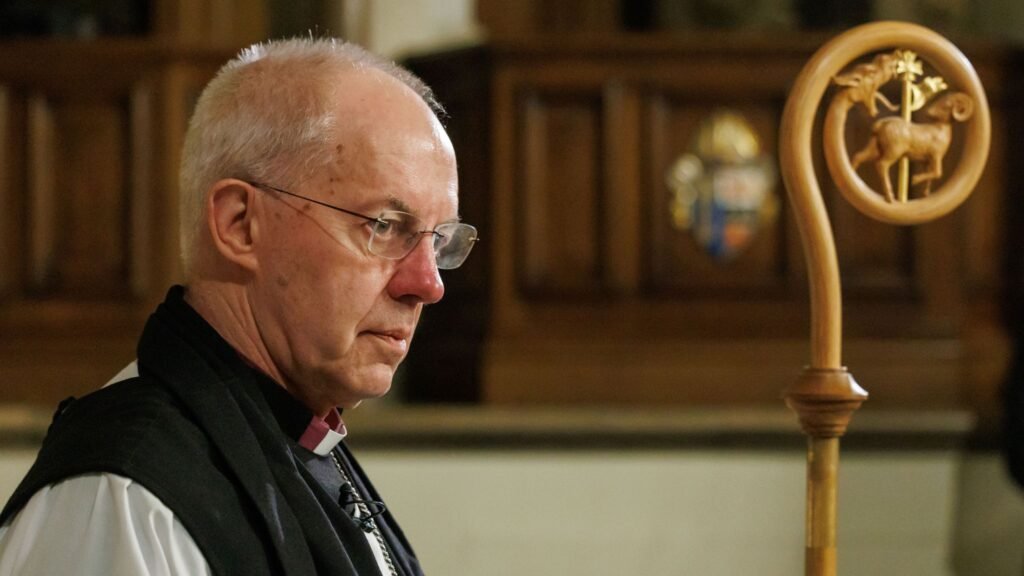Job Advertisements for the Archbishop of Canterbury: Seeking a Servant Leader of Utmost Integrity

Archbishop of Canterbury job advert seeks ‘servant leader of utmost integrity
Introduction to the Role
The position of the Archbishop of Canterbury is one of immense historical and spiritual significance within the Anglican Communion and beyond. As the senior bishop and principal leader of the Church of England, the Archbishop acts as a pivotal figure, representing not only the national church but also the broader Anglican community, which spans across various cultures and countries. Historically, this role has been filled by individuals of great stature and integrity, tasked with guiding the moral and ethical compass of the church during times of societal change and turmoil.
The responsibilities of the Archbishop are multifaceted and encompass various domains, including pastoral care, theological teaching, and administrative leadership. The Archbishop is responsible for overseeing the spiritual well-being of millions of Anglicans worldwide, fostering relationships among the diverse Anglican provinces, and engaging in ecumenical dialogues with other Christian denominations. This role requires a deep commitment to servant leadership, characterized by humility, empathy, and a dedication to fostering unity within the church.
Beyond the confines of ecclesiastical duties, the Archbishop of Canterbury holds a significant position in the public arena. The occupant of this pivotal role often engages with governmental and social entities, addressing pressing moral and ethical issues that affect society at large. The Archbishop is expected to be a voice of reason and compassion, championing social justice, peace, and reconciliation in a world often divided by conflicts and disparities.
Ultimately, the Archbishop’s role is one of both reverence and responsibility, embodying the core values of the Anglican tradition while navigating the complexities of contemporary society. The search for a new Archbishop not only signifies a change in leadership but also the continuation of a legacy that seeks to inspire and uplift the church and the world at large.
The Key Attributes Sought
The position of the Archbishop of Canterbury embodies a unique intersection of spiritual leadership and societal influence, greatly emphasizing the importance of specific attributes that align with the essence of servant leadership. One of the fundamental qualities highlighted in the job advertisement is integrity. This attribute is paramount, as the Archbishop is not merely a religious leader but also a public figure whose actions and decisions resonate throughout communities and beyond. Integrity in this context implies consistency in values, ethics, and transparency, establishing trust among the diverse groups within the church and the wider society.
In addition to integrity, compassion emerges as a vital characteristic expected of the Archbishop. This quality enables a deeper connection with individuals from various backgrounds, fostering an environment of understanding and support. Compassionate leadership is essential in addressing the challenges faced by congregation members, as well as broader societal issues. By demonstrating empathy, the Archbishop can effectively navigate complex emotional landscapes and engage actively with those in need.
Another essential attribute is wisdom, which encompasses not only knowledge but also the judicious application of that knowledge in decision-making processes. A wise leader is capable of discernment and can guide the church through uncertain circumstances with discerned insight. Such wisdom is especially crucial in times of societal change, where the church’s role must adapt while remaining rooted in its core beliefs.
Finally, humility stands as a cornerstone of effective servant leadership. The Archbishop is expected to embody a humble nature that prioritizes the needs of others over personal ambition. This characteristic allows for collaborative dialogue and further enhances the church’s mission towards fostering community and spiritual growth. Together, these attributes—integrity, compassion, wisdom, and humility—encapsulate the quality of a servant leader that the Archbishop of Canterbury must exemplify in both spiritual and community leadership.
The Importance of Integrity in Leadership
Integrity is a cornerstone of effective leadership, particularly in religious institutions such as the Church of England. This fundamental quality serves as the foundation upon which trust and respect are built. Leaders in these roles are often seen as moral exemplars, and their actions significantly influence the faith community’s perception of ethical behavior. When integrity is maintained, it fosters a culture of accountability and transparency, essential for spiritual development and community cohesion.
Historically, various leadership crises have underscored the repercussions of compromised integrity. One prominent example involves the scandal surrounding high-profile church leaders who were implicated in financial mismanagement or unethical conduct. Such incidents not only damaged the leaders’ reputations but also eroded public trust in the institutions they represented. Congregants often feel disillusioned and may distance themselves from the community, leading to a ripple effect that diminishes participation and commitment within the church.
Furthermore, the implications of leadership integrity extend beyond immediate followers. In religious settings, leaders are tasked with guiding ethical frameworks and imparting moral teachings. When integrity is questioned, it undermines the leader’s ability to advocate for those values convincingly. People may struggle to reconcile the teachings they receive with the behavior exhibited by their leaders, resulting in doubt and skepticism towards religious precepts.
In contrast, leaders who demonstrate unwavering integrity can inspire and motivate their congregations, fostering a robust and vibrant faith community. Their commitment to moral principles cultivates a sense of safety, encouraging open dialogue and collaboration. This climate not only strengthens the bonds among community members but also reinforces the organization’s mission and values, vital for sustainable growth and healing.
Challenges Facing the Archbishop of Canterbury
The role of the Archbishop of Canterbury embodies significant responsibilities, especially in today’s rapidly changing societal landscape. The next archbishop will grapple with numerous challenges that could shape the future of both the Church of England and the wider Anglican Communion. One of the foremost challenges is the ongoing societal changes that impact religious practices and community engagement. Modern issues such as secularism, a decline in church attendance, and competing ideologies necessitate a leader who can navigate shifting cultural attitudes while remaining relevant to an increasingly diverse populace.
Additionally, the importance of interfaith dialogue cannot be understated. As communities become more multicultural and interconnected, the Archbishop must foster relationships between different faith traditions. Promoting understanding and cooperation among various religious groups is crucial, especially in the context of growing polarization and conflict in many societies. The Archbishop will be expected to lead initiatives that bridge gaps between communities, reinforcing the message of love, respect, and collaboration inherent in Christian teachings.
Maintaining unity within the Anglican Communion presents another significant challenge. This global fellowship encompasses a myriad of theological perspectives, cultural practices, and social ideals. As societal norms evolve, issues such as gender equality, LGBTQ+ inclusion, and reproductive rights often pose tensions within the fellowship. The new archbishop will be required to provide pastoral leadership that honors diverse opinions while striving to maintain cohesion within this broad and variegated body. The ability to listen, understand, and guide with empathy and integrity will be essential qualities for the future archbishop.
In conclusion, the next Archbishop of Canterbury will face multiple complex challenges that demand a servant leader possessing both wisdom and discernment. Addressing societal changes, engaging in interfaith dialogue, and fostering unity within the Anglican Communion will be critical in ensuring the church continues to fulfill its mission in modern society.
Historical Context and Predecessors
The role of the Archbishop of Canterbury is steeped in a rich historical legacy that spans over 1,400 years. As the principal leader of the Church of England and a key figure in the wider Anglican Communion, past Archbishops have significantly influenced both religious and social landscapes. Notable figures such as Thomas Becket in the 12th century stand out as exemplars of integrity and servant leadership. St. Thomas Becket’s unwavering moral stance against King Henry II’s attempts at encroaching on church privileges ultimately cost him his life, highlighting the profound commitment of an Archbishop to uphold spiritual values above earthly power.
Another esteemed predecessor, William Temple, who served during the mid-20th century, demonstrated servant leadership through his engagement with social issues, advocating for the poor and promoting ecumenism. Temple’s emphasis on the Church’s responsibility toward societal needs remains relevant today as candidates aspire to embody a similar integrity. His work during World War II, fostering a sense of unity amidst division, exemplifies how the Archbishop can serve as a moral compass during tumultuous times.
Modern leaders have equally contributed to this legacy. Rowan Williams, who served from 2002 to 2012, is notable for his intellectual approach to theology and his emphasis on interfaith dialogue. Williams’s tenure was marked by his efforts to navigate complex issues facing the Church, demonstrating the necessity for both integrity and humility in leadership. Through these historical lenses, the role of the Archbishop of Canterbury emerges not merely as an ecclesiastical position but as a profound commitment to servant leadership that strives for justice, reconciliation, and community engagement.
The Role of Community Engagement
The new Archbishop of Canterbury is not only a spiritual leader but also a key figure in fostering community engagement, both locally and globally. The role emphasizes the importance of outreach initiatives that resonate with a diverse range of communities, highlighting the necessity for a leader who embodies the principles of accessibility, inclusivity, and compassion. In this capacity, the Archbishop is called upon to advocate for marginalized groups and to promote social justice, ensuring that the Church serves as a beacon of hope and support.
A significant aspect of community engagement is the development of pastoral care programs that address the needs of the congregation and surrounding areas. The Archbishop will be expected to lead initiatives that extend beyond the church walls, encouraging clergy and volunteers to participate in grassroots efforts aimed at addressing societal challenges. This could involve collaborating with local organizations, championing causes such as homelessness, hunger, and mental health support, thereby reinforcing the Church’s commitment to service in the wider community.
Moreover, being a servant leader entails a deep understanding of the complexities faced by different populations. The new Archbishop will be tasked with cultivating relationships that bridge divides, fostering dialogue among faith groups, civic organizations, and other community stakeholders. This inclusive approach is essential for promoting harmony and understanding, further emphasizing the Church’s role in championing peace and justice in an increasingly fragmented society.
In essence, the successful candidate will need to embody a commitment to holistic community engagement, striving to empower individuals while also advocating for systemic change. By emphasizing outreach and pastoral care, the Archbishop can play a pivotal role in reflecting the Church’s mission to serve as a guide in the pursuit of social justice, ultimately contributing to the betterment of society as a whole.
Implications for the Future of the Anglican Church
The appointment of a new Archbishop of Canterbury holds significant implications for the future trajectory of the Anglican Church. As the spiritual leader of the Church of England and a key figure in the worldwide Anglican Communion, the Archbishop’s vision and leadership style can influence how the church addresses contemporary challenges, including declining membership and societal shifts. It is essential for the new appointee to recognize the necessity for modernization while respecting longstanding traditions.
One of the primary strategies the new Archbishop might pursue involves fostering an inclusive environment that attracts a diverse congregation. This could entail reevaluating church programs and services to better meet the needs of a multicultural society. Engagement with younger demographics through social media initiatives, outreach programs, and community events may be pivotal in revitalizing interest and participation within the church. The new leader’s approach could also incorporate more contemporary worship styles while maintaining the theological foundations that underpin the Anglican faith.
Furthermore, the Archbishop can innovate the church’s mission to focus more on social justice and community service, addressing pressing global issues such as inequality and climate change. By positioning the church as a proactive agent for change, the new leader can rebuild trust and relevance in a time where many perceive organized religion as disconnected from real-world problems. It is crucial for the Anglican Church to be adaptable, utilizing creative ministries and partnerships to engage members, old and new, in meaningful dialogue and action.
Ultimately, the decisions made by the new Archbishop of Canterbury will significantly impact not only the Anglican Church’s current membership but also its future relevance in an ever-evolving world. As strategies are implemented for revitalization, the focus must remain on being a servant leader of integrity, embodying the values of compassion and inclusiveness that define the ethos of the church.
The Selection Process
The selection process for the Archbishop of Canterbury is a meticulously designed procedure that reflects the importance of this esteemed position within the Church of England. The process predominantly involves the Crown Nominations Commission (CNC), which is responsible for recommending candidates for the role. This commission includes a range of members, such as bishops, clergy, and lay representatives, ensuring diverse perspectives during the evaluation of potential leaders.
The timeline for the selection process can vary significantly depending on circumstances surrounding the vacancy. Typically, the CNC begins its work immediately following the announcement of an Archbishop’s retirement or resignation. The process may take several months, allowing ample time for thorough consultation and deliberation among the commissioners. Input from the wider church community and external stakeholders is also gathered to enrich the decision-making process, demonstrating a commitment to inclusivity.
Central to the evaluation of candidates are specific criteria that reflect the expectations of the role. These criteria include theological acumen, leadership ability, management skills, and a deep commitment to service. The ideal candidate is expected to exemplify qualities of integrity, humility, and a passion for fostering communal relationships within and outside the church. Ensuring transparency throughout the process is essential, as it promotes trust and confidence in the final decision. Public engagement through announcements and updates helps bridge any gaps between the church leadership and the congregations it serves.
In sum, the selection process for the Archbishop of Canterbury is a robust procedure guided by the principles of discernment, transparency, and community involvement—ultimately striving to identify a servant leader who embodies the values of the Church. By engaging a diverse group of stakeholders and maintaining a clear timeline, the CNC aims to deliver a candidate of utmost integrity and vision.
Conclusion: The Call for a New Leader
As the search for a new Archbishop of Canterbury begins, it is imperative to understand the significant role that this position plays in guiding not only the Church of England but also in influencing wider societal values. The attributes sought in a new leader are multifaceted, emphasizing a blend of spiritual integrity, visionary leadership, and an unwavering commitment to service. The ideal candidate must possess a deep understanding of the modern challenges facing the church and society, ensuring that tradition and contemporary relevance coexist harmoniously.
Among the critical attributes desired in the next Archbishop is an exemplary moral compass, reinforcing the Church’s commitment to integrity and honesty. In a world grappling with issues such as social injustice and moral ambiguity, the new leader must be a trustworthy figure capable of fostering unity and inspiring diverse congregations. Additionally, a forward-thinking approach is essential, particularly the ability to engage with the youth and harness contemporary means of communication. This engagement can facilitate a renewed connection between the Church and the broader community, allowing for the exploration of faith in a rapidly changing world.
Challenges lie ahead for the future Archbishop, including navigating complex societal issues and addressing declining church attendance. However, these challenges also present opportunities for renewal and growth within the church. A strong, empathetic leader can catalyze positive change, encouraging dialogue and fostering an inclusive atmosphere that invites all to explore their faith. With the right guidance, the Church of England can evolve to meet the needs of its members and society, reaffirming its relevance and commitment to service. Therefore, the call for a servant leader of utmost integrity is more crucial than ever, promising a hopeful and transformative future for both the church and the community it serves.










Leave a Reply
You must be logged in to post a comment.